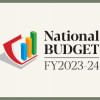Reining in inflation top priority

The government is going to unveil a Tk 7,61,785 crore budget for the next fiscal year on Thursday, setting containment of high inflation as a major target.
The budget would aim at curbing inflation and maintaining the higher GDP growth trajectory, a high official of the finance ministry told The Daily Star.
It would not be "expansionary or contractionary", added the official seeking anonymity.
The budget, the last of this Awami League government's five-year term, comes at a time when people are struggling to cope with high prices for almost everything, from food to fuel and from transport fares to utility bills.
The government wants the growth to hit 7.5 percent in the next fiscal year and keep the inflation rate around 6 percent.
The provisional estimate of Bangladesh Bureau of Statistics (BBS) shows that the GDP has grown by 6.03 percent in the current fiscal year and the inflation rate was 8.4 percent till April.
The next budget will be 12.34 percent bigger than the current one.
It will be 15.21 percent of the projected GDP of Tk 50,06,672 crore, compared to 15.27 percent in the current fiscal year. This shows that the next budget is not ambitious, the finance ministry official pointed out.
Finance Minister AHM Mustafa Kamal is set to deliver his budget speech titled "The progress of Smart Bangladesh after a decade and a half of development" in parliament on Thursday.
There will not be any major increase in the allocations for sectors like health, education, and social safety net.
Higher allocations will be made for subsidies, more than Tk 1.10 lakh crore, and for interest payments, around Tk 1.02 lakh crore. In the current fiscal year, the allocation for subsidies was around Tk 81,000 crore and for interest payment around Tk 80,000 crore.
The allocations are being raised to cushion the blows of high prices of commodities in the international market and the weak taka.
Another finance ministry official said the electricity and fertiliser prices have been raised to shed some subsidy burden but the government still needs more money for subsidies to clear arrears.
The official said the government will continue to maintain the austerity measures in the next fiscal year to reduce pressure on foreign reserves.
Salaries of government officials will not be raised through the budget, the official said.
REVENUE TARGET
Keeping in mind a condition of the IMF's $4.7 billion loan programme, the government targets a revenue collection of Tk 5 lakh crore, around Tk 67,000 crore more than that in FY23.
According to the IMF condition, the finance ministry has to adopt revenue measures in a way that can "yield an additional 0.5 percent of the GDP in the FY24".
The finance ministry official said the total tax-revenue collection target for FY24 would be the actual revenue generated in FY23 plus the additional 0.5 percent of the FY24 GDP.
The projected GDP for the next fiscal year is Tk 50,06,672 crore, and 0.5 percent of it is Tk 25,034 crore.
To achieve the revenue collection goal, several measures, including recruitment of private agents across the country, have been taken to increase the number of taxpayers, the official said.
The agentswill go door to door to convince people to come under the tax net, and help people open tax files and submit returns, the official said, adding that the agents would not collect taxes.
People, who have tax identification numbers (TINs) and are below the taxable income ceiling, must submit their returns and pay a minimum tax of Tk 2,000.
The taxable income ceiling will be raised to Tk 3.50 lakh from the current Tk 3 lakh. The minimum tax on taxable income will remain the same, at Tk 5,000.
The official said people with no taxable income will have the option to cancel their TIN.
There are around 88 lakh TIN-holders but only around 30 lakh submit their returns. Many of those who submit returns don't pay tax as their incomes are not taxable.
Another finance ministry official said they will install more electronic fiscal devices (EFDs) to ramp up revenue collection.
Over the next three years, three lakh EFDs will be set up. At present, 9,000 EFDs are in operation.
Regarding the IMF recommendation for reducing tax exemptions, the official said it would be implemented gradually in the next budget.
An IMF technical mission is due in July to see how revenue collection could be improved.
BUDGET DEFICIT
The overall deficit in the next budget will be Tk 2,61,785 crore, which is 5.2 percent of the GDP.
To meet the deficit, the government plans to borrow Tk 1,50,785 crore from domestic sources, including banks, and Tk 1,11,000 crore from foreign sources.
But an IMF loan condition limits the primary deficit to 3 percent of the GDP.
The official said the deficit is actually close to the IMF-set limit since the primary deficit excludes interest payments and foreign grants, from the overall deficit.
The primary deficit target for FY24 is 3.1 percent of the GDP.

 For all latest news, follow The Daily Star's Google News channel.
For all latest news, follow The Daily Star's Google News channel. 








Comments